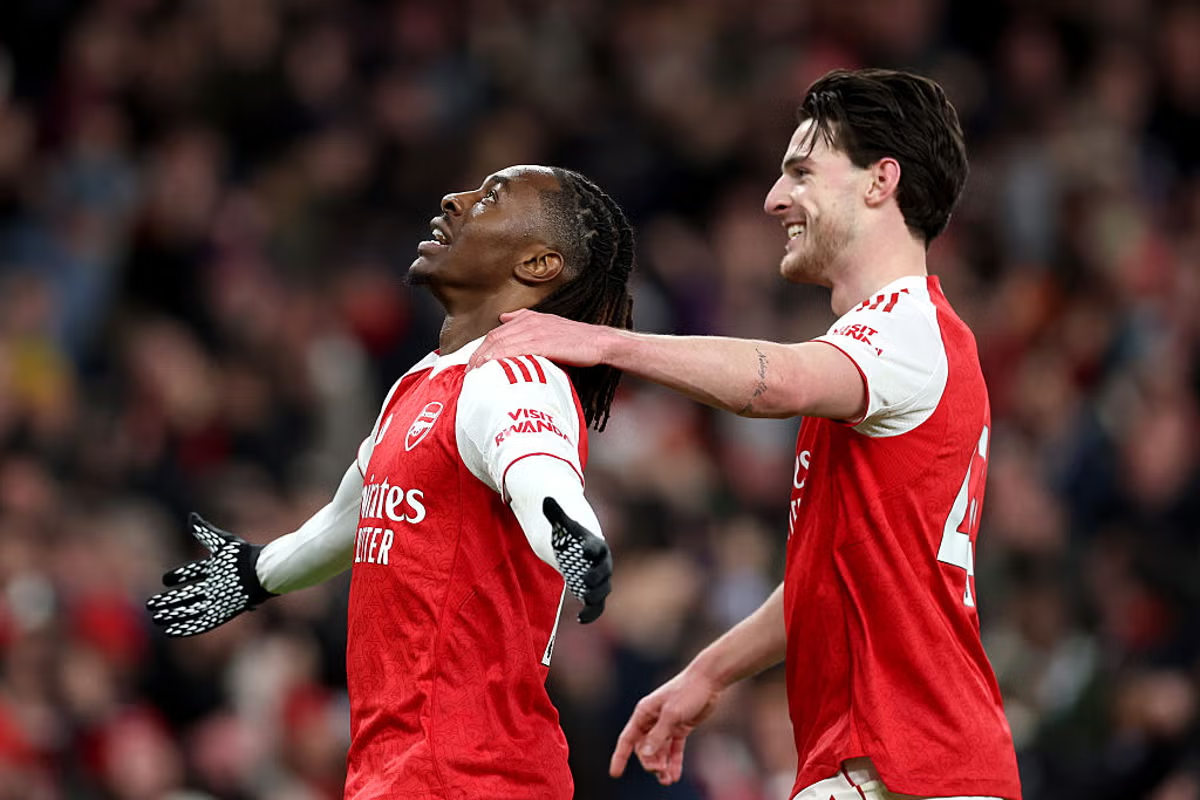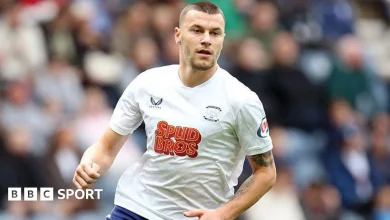The end of Arsenal’s wait – and maybe a Premier League era?

Join the Miguel Delaney: Inside Football newsletter and get behind-the-scenes access and unrivalled insight
Join the Miguel Delaney: Inside Football newsletter
Join the Miguel Delaney: Inside Football newsletter
The article below is an excerpt from the free Monday edition of the Miguel Delaney: Inside Football newsletter. To get my latest analysis, reporting and insights delivered straight to your inbox, sign up by entering your email address in the box above.
Members of Inside Football get an extra bonus edition every Friday. Become a member here.
Before the jubilant Arsenal team returned to the dressing room on Sunday evening, some of their injured absentees made a point of going in just beforehand. That was because they wanted to applaud their teammates in, over what everyone thought was a near-perfect display. This is now the level, that they want to further raise.
There was even some sympathy for Tottenham Hotspur manager Thomas Frank. Some staff were watching his post-game interviews after the 4-1 defeat, where the Dane repeatedly spoke about how his side too easily lost “duels”. The belief within the Arsenal camp – echoed by some close to Spurs – was that he couldn’t say what he actually thought, for fear of the tribal backlash. That was that Arsenal were basically too good. Spurs couldn’t get close to them.
Amid injuries, Frank went for a 5-4-1 formation to try and go man for man with Arsenal… but Mikel Arteta’s side gradually wore them out.
There may be a more ominous element for everyone else, too. Many of those players who lined up at the dressing-room door are this week going to be lining up for selection again, too. All of Martin Odegaard, Gabriel Jesus and Gabriel Martinelli are expected to return, with Kai Havertz the only attacker still set to be missing for a few more weeks.
It only sharpens the edge of Sunday’s match at Chelsea, which has now adopted a new importance.
In second place and six points behind Arsenal in the table, Enzo Maresca’s side may have a timely opportunity to undercut all of this excitement, to bring Arteta’s side back down to earth and let them know they’re still in for a real battle.
There’s a confidence growing at Chelsea, too, after all.
The fixture does constitute part of a tough run for Arsenal, that started with the 2-2 draw away to Sunderland and continues with a home game against an awkward Brentford and then another charged trip to Unai Emery’s resurgent Aston Villa.
Much may depend on the very attrition of the Premier League – the resilience of sides like Brentford – and how its competitive balance can level things out.
Liverpool have found this to their cost, despite spending over £400m on new stars. They’ve succumbed to something that has been a distinctive pattern in the Premier League, and now an increasingly discussed theme.
That is how often the reigning champions struggle to defend their title, or outright collapse. For the most instructive examples, just look at Chelsea in 2015-16 and 2017-18, Leicester City in 2016-17, Manchester City in 2012-13 and Liverpool themselves in 2020-21.
There are admittedly unique factors in each of these, that allow for the possibility that it’s largely coincidence.
Jose Mourinho’s spell over the Chelsea team had actually been broken by 2014-15, as the players were stunned at how much he was talking about referees, before a notorious third campaign. Antonio Conte then got into familiar arguments over transfers in 2017-18, with Roberto Mancini having endured similar at City. Leicester, of course, drastically over-performed and were always going to revert.
With this Liverpool, there is the great unknown of how the club are responding to the passing of Diogo Jota. It is jarring to talk about genuine human tragedy with regards to how mere football results are affected, but this is the context the team are playing in. Has it had any influence on how the champions seem to fall apart with any setback, as if they just can’t go behind in a game in the manner Chelsea struggled with in 2015-16?
In pure football terms, Arne Slot could do with deciding on a team for the medium term and committing, rather than constantly changing in a manner that now suggests indecision rather than tactical variability.
On that, much more telling than the list of poor title defences is the list of managers who have retained the Premier League. There are only three: Sir Alex Ferguson, Mourinho and Pep Guardiola.
So, three all-time greats, one of them at the wealthiest club that dominated for two decades, one of them immediately after a Russian oligarch had gone on what was then the most excessive spending spree ever seen, and one of them a sportswashing project with limitless funding.
These are obviously fairly exceptional circumstances, that arguably point to what is required to win relentlessly in the Premier League.
Teams have to have something institutionally deeper to be able to go above and beyond because the league generally has an otherwise healthy competitive balance throughout. That just changes at the top, since it didn’t really feel like this over the past eight years, as City won six titles out of seven.
And yet the collapse of Guardiola’s side last season pointed to another shift, to go with Crystal Palace winning the FA Cup and how so many of the so-called “middle classes” – the Bournemouths and Brightons – enjoyed such a rise. The argument made in this very newsletter was that this new democracy was an illustration of how Profit and Sustainability Rules were finally having full effect – and very much working. They stopped the wealthiest clubs being able to readily prey on those below.
Many executives at those clubs feel the same, which is precisely why six of them – with four understood to be Bournemouth, Brighton, Palace and Brentford, alongside Fulham and Leeds United – voted against the shift to Squad Cost Ratio for the future this week.
The new regulation, termed SCR, will allow clubs to spend 85 per cent of football revenue and net/profit loss on players, with a further multi-year allowance of 30 per cent to enable greater “ambition”.
It is curious how ambition in football seems mostly defined by spending. That also sounds great if you’re a mega club regularly in the Champions League.
It’s why there’s a fair argument – reflected in the voting – that the new system will just favour the wealthiest clubs and owners, arguably resetting all of the recent benefits of PSR, especially without the necessary check of “anchoring” – limiting the expenditure of the top club as a multiple of the revenue of the bottom club. Many have already noted how Uefa’s SCR system is still balanced by their PSR equivalent. The Premier League says it may return to “anchoring”. It’s going to find it needs to.
The reason for this is how much tougher it’s going to be for middle-class clubs to comply with the regulations without good player sales. It’s an element – like PSR unexpectedly incentivising selling academy products – that feels counter to the progress of the last few years.
In the words of one prominent executive, “it’s so easy to see what will happen, the gap to the top will widen, some clubs are going to face real challenges”.Hence Antoine Semenyo is probably even likelier to move on in January.For now, a healthy competitive balance may keep Arsenal’s title challenge compelling. For the future, however, we are likely to see a top tier moving off from the rest.
How to sign up
Miguel Delaney’s Inside Football newsletter lands in your inbox every Monday and Friday (The Independent)
To receive the free, Monday newsletter simply enter your email address in the box at the top of this page.
You can also head to our newsletter preference centre to sign up for the email. Once there, all you need to do is press the ‘+’ button and enter your email address.
To unlock the Friday edition of Miguel Delaney: Inside Football and get full access, click here to become a member.





